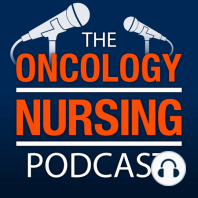24 min listen

Episode 299: Pharmacology 101: Plant Alkaloids
Episode 299: Pharmacology 101: Plant Alkaloids
ratings:
Length:
37 minutes
Released:
Feb 16, 2024
Format:
Podcast episode
Description
“I can't stress enough how often I get questions about, ‘Is this the paclitaxel doing this? Is this the docetaxel doing this?’ And coming up with strategies to kind of help get our patients through with supportive care is important. It's a really big opportunity for pharmacists and our nurses to really provide it and help our patients get through and show the knowledge that we have and to help them,” Dane Fritzsche, PharmD, BCOP, oncology informatics pharmacist at the Fred Hutchinson Cancer Center and University of Washington Medicine in Seattle, WA, told Jaime Weimer, MSN, RN, AGCNS-BS, AOCNS®, manager of oncology nursing practice at ONS, during a discussion about the plant alkaloid drug class. You can earn free NCPD contact hours after listening to this episode and completing the evaluation linked below. Music Credit: “Fireflies and Stardust” by Kevin MacLeod Licensed under Creative Commons by Attribution 3.0 Earn 0.75 contact hours of nursing continuing professional development (NCPD) by listening to the full recording and completing an evaluation at myoutcomes.ons.org by February 16, 2026. The planners and faculty for this episode have no relevant financial relationships with ineligible companies to disclose. ONS is accredited as a provider of NCPD by the American Nurses Credentialing Center’s Commission on Accreditation. Learning outcome: Learners will report an increase in knowledge related to plant alkaloids. Episode Notes Complete this evaluation for free NCPD. Oncology Nursing Podcast series: Pharmacology 101 Cancer Symptom Management Basics Oncologic Emergencies 101 ONS courses: ONS/ONCC Chemotherapy Immunotherapy Administration Certificate™ ONS Fundamentals of Chemotherapy and Immunotherapy Administration™ ONS books: Chemotherapy and Immunotherapy Guidelines and Recommendations for Practice Clinical Guide to Antineoplastic Therapy: A Chemotherapy Handbook Clinical Journal of Oncology Nursing articles: Vincristine Minibag Administration: A Quality Improvement Project to Minimize Medical Errors Taxane-Induced Peripheral Neuropathy: Objective and Subjective Comparison Between Paclitaxel and Docetaxel in Patients With Breast Cancer Liposomal Irinotecan: Nursing Considerations in an Outpatient Cancer Center Extremity Cooling: A Synthesis of Cryotherapy Interventions to Reduce Peripheral Neuropathy and Nail Changes From Taxane-Based Chemotherapy ONS Huddle Card: Plant Alkaloids ONS Symptom Interventions and Guidelines ONS Voice article: Chemo-Induced Peripheral Neuropathy May Have a Link With Vitamin D Deficiency Hematology/Oncology Pharmacy Association patient education IV Cancer Treatment Education Sheets ChemoCare To discuss the information in this episode with other oncology nurses, visit the ONS Communities. To find resources for creating an ONS Podcast Club in your chapter or nursing community, visit the ONS Podcast Library. To provide feedback or otherwise reach ONS about the podcast, email pubONSVoice@ons.org. Highlights From This Episode “An alkaloid is an organic compound, so think carbon-based ring structure. The only thing special about alkaloid is that it has to contain at least one nitrogen atom.” TS 1:43 “Plant alkaloids are just alkaloids derived from plants itself, so think like the roots, stems, leaves, bark, and things like that. Each of these agents we'll discuss today are unique, but broadly speaking, all of them are extracted, at least when they were first discovered, from a plant source. And they are typically biosynthesized by these plants for defensive purposes.” TS 2:01 “Broadly speaking, [plant alkaloids] are cell cycle–specific agents. They do, depending on the compound, impact different parts of the cell cycle. Topoisomerase inhibitors is an example, so think irinotecan, which is a topoisomerase I inhibitor. There's topoisomerase II inhibitors, like etoposide being a good example. These impact the S phase in your cell cycle, so the synthesis of the DNA. Topoiso
Released:
Feb 16, 2024
Format:
Podcast episode
Titles in the series (100)
Episode 21: Normalizing the Use of Advance Directives in Cancer Care: ONS member Sincere McMillan, ANP-BC, MS, BSN, nurse practitioner at Memorial Sloan Kettering Cancer Center in New York City, joins Kathleen Wiley, RN, MSN, AOCNS®, oncology clinical team lead at ONS, to discuss the importance of advance care... by The Oncology Nursing Podcast